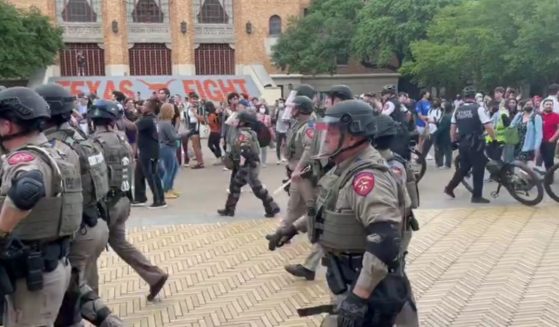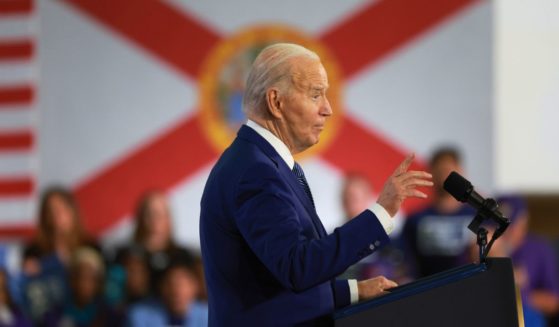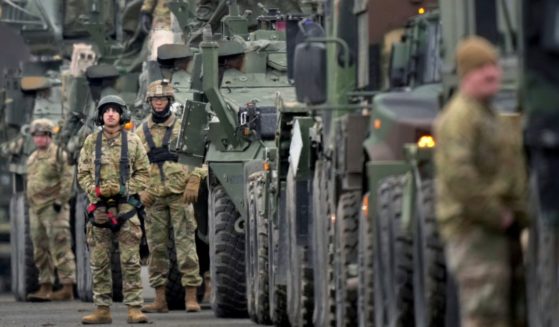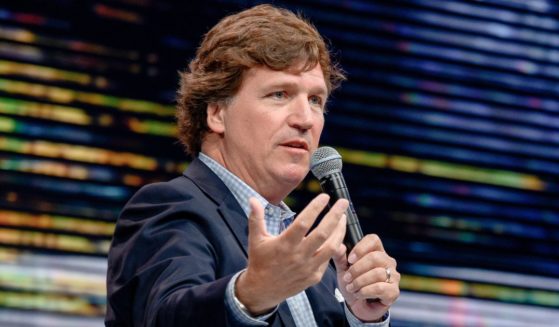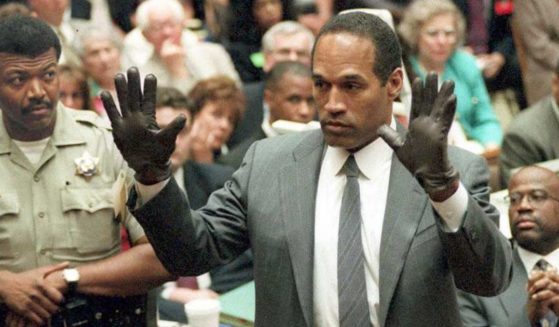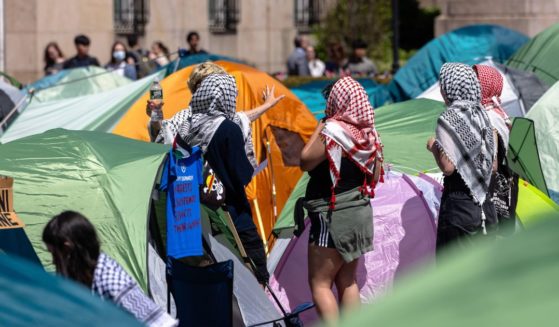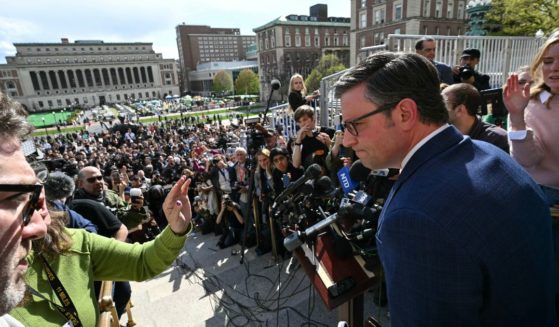Over 100,000 Legal Crossings Per Day Fueling Spike in COVID Cases at US-Mexican Border
The United States and Mexico announced last month they were extending an agreement to halt nonessential border crossings into each country amid the COVID-19 pandemic.
Nonetheless, some of the hottest coronavirus hot spots in the U.S. right now are in border counties, and there appears to be a clear reason: Over 100,000 people per day are crossing legally into California alone.
Imperial County is at the top of that state’s list with approximately 3,900 cases per 100,000 residents, which is over three times more than any other county in California.
Imperial, with a population of just 181,000, is located on the border just to the east of San Diego County.
Abutting it to the south is Mexicali, Mexico, population 1.1 million, which has been experiencing a severe COVID-19 outbreak.
“Now we have a surge [of coronavirus] in the Imperial Valley because the situation is so severe in Mexicali,” Carmela Coyle, president of the California Hospital Association, told The New York Times.
In an email obtained by The Western Journal, Coyle shared with hospital CEOs around the state that the medical facilities in Mexicali, as of late May, were full and “using crisis standards of care.”
In response, people were coming over the border into the U.S.
Both hospitals in Imperial County — El Centro Regional Medical Center and Pioneers Memorial Hospital — “have been overwhelmed with COVID patients,” Coyle said.
El Centro Regional is a small community hospital with 20 emergency room beds, 20 intensive care unit beds and 161 beds overall.
Pioneers Memorial, about 15 miles to the north of El Centro, has 107 beds total.
Coyle made an appeal to California hospitals to accept patients from the border region.
In a tweet late last month, California Gov. Gavin Newsom acknowledged the dire situation and announced he was working to reinstate a shutdown order for Imperial County.
NEW: Yesterday CA conducted over 76k #COVID19 tests.
Positivity rate: 5.7% over 7 days.
That rate in Imperial County, however, is at 23%. Hospitals there are overwhelmed.
So today we’re working with the county to reinstate a stay at home order.
We have to take this seriously.
— Gavin Newsom (@GavinNewsom) June 26, 2020
What he did not mention in the tweet is the reason COVID-19 cases are spiking in Imperial County is patients coming over the border.
Mediaite columnist John Ziegler responded to Newsom’s tweet with a map of California.
Uh, perhaps King @GavinNewsom and his subjects should look on a map to where Imperial County is, and he should be forced to admit what is clearly actually happening there… https://t.co/cbGRXscOm2 pic.twitter.com/XYoZY8NXDz
— John Ziegler (@Zigmanfreud) June 26, 2020
The Western Journal spoke with a doctor working at the El Centro Regional Medical Center who confirmed many of the patients the hospital is treating are believed to be Mexicali residents.
“What’s annoying about it is they’re saying, ‘OK, Imperial County is the highest per capita and shame on you, you haven’t gotten your numbers under control. We need to go back to stage 1, and you guys just need to close everything down again,'” said the physician, who agreed to be interviewed on a condition of anonymity.
“But what they’re not recognizing is that we’re drawing from a population of 1.1 million.”
“According to a nurse who lives in Mexicali, she said on the social media they were basically saying, ‘If you have COVID, don’t even bother going to the hospital in Mexicali. Go across to the U.S.,'” the doctor said.
By California law, hospitals are not permitted to ask questions regarding citizenship, the physician said.
The people El Centro Regional is treating, many of whom speak only Spanish, could have both Mexican and U.S. citizenship, while others are Mexicali residents who have work permits to enter the U.S.
The towns of El Centro and nearby Calexico are big agricultural communities, so many Mexicans cross the border to work in that industry and others deemed essential.
The doctor recounted that Newsom came down to the area last month and made the decision rather than surge medical capacity into the region, patients would be sent all over the state, both by air and land.
Janette Angulo, director of the Imperial County Public Health Department, testified before a California Senate committee June 30 that over 500 patients had been shipped out of the county over the previous two weeks to other hospitals.
“The logical question is what is causing the surge of cases and hospitalizations in our county?” she asked.
“Without a doubt, Imperial County is a highly mobile population. Even with international crossing restrictions, over 20,000 people are still crossing the international border from Mexicali into Calexico on a daily basis for work, health care and other business,” Angulo said.
Susan Fanelli, with the California Department of Public Health, testified that 10 to 15 patients are being transferred daily out of Imperial County.
Fanelli also highlighted that the 1.1 million population of Mexicali is contributing to the COVID-19 spike.
“We have about 25,000 traveling across the border in every day… in their essential workforce has put a big strain on Imperial County,” she said.
Neighboring San Diego County is faring better because of its much larger hospital infrastructure, but it is also seeing a larger influx of 75,000 to 80,000 border crossings per day and many new coronavirus cases, according to Fanelli.
The health expert said 60 to 70 percent of the county’s hospital admissions for COVID-19 in areas close to the border are those who traveled to Mexico or were connected to a family member who went to Mexico.
San Diego County took about half the hospital transfers initially from Imperial County.
“The impact of the border is great in both areas” of Imperial and San Diego counties, Fanelli said.
The doctor from El Centro Regional told The Western Journal that San Diego County has dried up as a place to send the hospital’s COVID-19 patients, and now they are being sent as far away as San Francisco and Sacramento by life flights, costing up to $100,000 each.
“We send them there, but we don’t tell them how they can get back again,” the physician said.
It creates many issues, including potential end-of-life decisions, with no family nearby with whom to confer.
The doctor does not blame Mexicans for seeking treatment in the U.S. but argued that rather than seeding all California with new cases, a better solution would be to surge capacity at the border, as was done in New York City.
Tim Thompson, founding pastor of 412 Murrieta Church in Riverside County (which is adjacent to Imperial), reached out to Samaritan’s Purse to see if the aid organization would be able to set up either in Mexicali or El Centro.
“It’s not that I don’t want these people to get help. People need held, they need help,” he told The Western Journal. “If we’re a position to be able to help them, we should.
“But you don’t help by stripping them away from their family, putting them on a plane or helicopter and saying, ‘We’re going to take you somewhere else,’ and they don’t even know where they are going and how they’re going to get back.”
Samaritan’s Purse confirmed by email to The Western Journal that it sent an assessment team to Mexicali and El Centro, but it said that, per policy, it would not reveal the details of discussions with authorities and why no green light was given to move forward.
Adolphe Edward, CEO of El Centro Regional, told The Western Journal he would be glad to have the Christian aid organization set up a field hospital in the area.
He indicated the state of California is in the process of setting up an alternate care site in the Imperial Valley with an 80-bed capacity to help with overflow from both El Centro and Pioneers hospitals.
“If I were king for a day, I would actually make sure that we have the 80 beds at the alternate care site staffed to keep family members here in the county or close to the Mexicali border, if they live across, and care for them here,” Edward said.
“I don’t really want to transfer anybody out of the county. My preference is to care for the patients closer to home.”
Last week, Thompson interviewed Dr. Jeff Barke for the pastor’s online program, “Our Watch,” during which they discussed the situation at the California-Mexico border and in the Golden State generally.
Thompson argued it is not fair to Imperial County and others, including potentially Riverside, to shut them down, because cases are increasing there, in part, because of border crossings.
“If we have to shut down everything here, then shut the border down, like we were told it’s shut down,” he said.
Imperial County is not alone in experiencing a cross-border COVID-19 influx.
In Arizona, the county with the highest rate of cases per 100,000 residents is Santa Cruz, with more than 4,300.
Like Imperial County, the entire population of Santa Cruz, 46,000, is dwarfed by the Mexican border city immediately to the south, Nogales, Sonora, with 212,000 residents.
Truth and Accuracy
We are committed to truth and accuracy in all of our journalism. Read our editorial standards.

